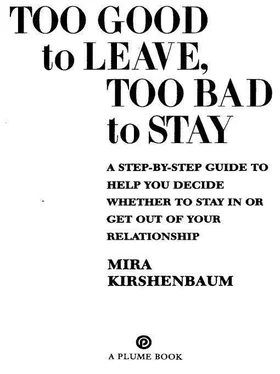Kirshenbaum, Mira - Too Good to Leave, Too Bad to Stay
Здесь есть возможность читать онлайн «Kirshenbaum, Mira - Too Good to Leave, Too Bad to Stay» весь текст электронной книги совершенно бесплатно (целиком полную версию без сокращений). В некоторых случаях можно слушать аудио, скачать через торрент в формате fb2 и присутствует краткое содержание. Жанр: Психология. Описание произведения, (предисловие) а так же отзывы посетителей доступны на портале библиотеки ЛибКат.
- Название:Too Good to Leave, Too Bad to Stay
- Автор:
- Жанр:
- Год:неизвестен
- ISBN:нет данных
- Рейтинг книги:3 / 5. Голосов: 1
-
Избранное:Добавить в избранное
- Отзывы:
-
Ваша оценка:
- 60
- 1
- 2
- 3
- 4
- 5
Too Good to Leave, Too Bad to Stay: краткое содержание, описание и аннотация
Предлагаем к чтению аннотацию, описание, краткое содержание или предисловие (зависит от того, что написал сам автор книги «Too Good to Leave, Too Bad to Stay»). Если вы не нашли необходимую информацию о книге — напишите в комментариях, мы постараемся отыскать её.
Too Good to Leave, Too Bad to Stay — читать онлайн бесплатно полную книгу (весь текст) целиком
Ниже представлен текст книги, разбитый по страницам. Система сохранения места последней прочитанной страницы, позволяет с удобством читать онлайн бесплатно книгу «Too Good to Leave, Too Bad to Stay», без необходимости каждый раз заново искать на чём Вы остановились. Поставьте закладку, и сможете в любой момент перейти на страницу, на которой закончили чтение.
Интервал:
Закладка:
• Can you let go of being bothered by the problem?
• Is he able to change?
Let’s deal with these one at a time.
STEP
#15:
BEYOND DENIAL
The word denial is tossed around so often and so glibly these days that I’m afraid it’s lost its usefulness. So I’m going to use that word as little as possible here. Instead I’m going to talk about things like blindness and ignorance about who you are and what you’re doing and what its effects are on the people around you and what the long-term consequences are.
Blindness and ignorance about what problems? We can begin with alcoholism and other forms of substance abuse: “I’m not a problem drinker, I just like to have a couple of drinks in the evening to unwind.” But he always has these drinks, and there are more than just a couple, and he unwinds himself into a stupor.
I’m also talking about a range of psychiatric problems, such as paranoia and a number of personality disorders that involve a refusal to acknowledge that there’s anything wrong as part of the symptomatology.
And I’m also talking about all the other things we’re blind to that we do to spoil relationships, from constantly maneuvering for control to not answering questions to issuing an endless stream of putdowns disguised as humor to nagging to having no energy to not being informed about what you’re talking about to being essentially uninterested in the people close to you. I’m talking about things like people not knowing they’re boring lovers or domineering parents or neglectful housekeepers or overbearing personalities who can’t stand to lose an argument or hotheads who blow up into wild rages.
I’m talking about someone like King Lear, whose daughter said about him, “He hath ever but slenderly known himself,” and whose whole tragedy grew out of that.
Mandy’s Story
People can close their minds and eyes to any possible aspect of who they are. Let me tell you about Mandy’s husband Bob, aka Mr. Selfish. While Bob might seem superficially like a lot of men and women you’ve known, he takes selfishness much further.
Bob is a professor of philosophy. If Bob were merely self-absorbed in a charming absentminded-professor way, or if you could somehow wake him up from his deep sleep of self-absorption, it might be easier to tolerate him. But no matter how blatant an act of selfishness you catch Bob in, he will either not admit he did it or not admit it was selfish. He might even rigorously defend it.
There are two ingredients here:
1. Selfishness. It’s not that Bob has any interest in dominating his wife, Mandy. He’s happy for her to do what she wants and be what she wants to be. It’s just that he simply cannot see outside of his own needs any more than someone on television can see you watching him.
So, for example, with very few demands on his time and a sense of himself as a free spirit, Bob hates plans, schedules, and appointments. If they have to do anything together, Bob simply can’t “get” a conversation about making appointments and is unable to participate in it. If Mandy says it’s important to her to schedule things because of her many commitments as an acupuncturist, Bob cannot see why it would be important. If they somehow do manage to schedule things, he can’t see why his adhering to the schedule is important.
2. The other ingredient is Bob’s utter cluelessness, his inability to perceive his own selfishness. What an enormous difference it would make if Bob could say yes, I know, I am selfish. But instead he’s got a million reasons and explanations and justifications for what he does, thereby annihilating everyone else’s needs. You’ve seen talk shows on which some selfish guy is paraded for all to see, but most of them don’t have a philosophy professor’s ability to come up with passionately reasoned justifications.
For example, when it comes to his refusal to cooperate with Mandy in any scheduling of an event Bob needs to be part of, he chides her for being uptight, petty, rigid, controlled by time instead of controlling time. He essentially has a philosophy for why her need to plan events is wrong. That philosophy is what keeps him blind.
I asked Mandy the question I’ll ask you:
Diagnostic question #15 . Does your partner neither see nor admit things you’ve tried to get him to acknowledge that make your relationship too bad to stay in?
Of course this kind of blind ignorance is annoying no matter what it’s about, but what I’m talking about here is your partner’s closing his eyes and mind to one of his problems that bores right through you like a bad headache when you think about the things that make your relationship too bad to stay in.
The Quicksand of Denial
If these things don’t matter to you, there’s no problem. But if they really do matter, you’re in for sheer hell. It’s not only that the problem won’t change—that’s obvious. But there’s something about this kind of blindness and ignorance that endlessly tantalizes you. People whose partners deny something important like this don’t usually come right out and say their partners cannot and will not see the problem. They say instead, “I am really trying to get him to see the problem and even though I was discouraged about it yesterday, today I really feel I’ve come up with a way to make him see it.”
After all, what’s easier than seeing? It’s something we do ten thousand times a day on the other side of every blink. It’s that seeming ease of seeing that’s so tantalizing. Any day now, we think, they’ll get it. Dawn will come. Light will shine. As if poked by an electric prod, our partners will leap into sudden realization of whatever it was they hadn’t seen before. It all seems so tantalizingly easy that we don’t acknowledge what should have been so easy for us to see: that if our partner can’t see something that’s so easy to see, there’s something wrong there and that means there’s a good chance they’ll never see it.
So what do you do if you answered yes to question #15? Here’s the guideline:
GUIDELINE # 15
If there’s something your partner does that makes your relationship too bad to stay in, and if you’ve tried to get him to acknowledge it and he simply cannot and does not, then that problem will just get worse over time. If the thought of a lifetime with it getting worse is not acceptable, you’ll be happiest if you leave. Quick take: If your partner can’t even see what it is about him that makes you want to get out, it’s time to get out.
Let me be blunt: People are rarely happy they hung in there with someone who refuses to acknowledge an issue of critical importance to them. But what does it mean exactly for your partner to “acknowledge doing something that makes the relationship too bad for you to stay in”?
One thing is for sure: it’s got to be more than just words. Your partner’s got to have a shock of recognition about what he’s doing. Of course acknowledging means saying “yes, I do that” or “yes, I am that way.” But he’s also got to convey the sense that he sees how what he’s doing is a problem for you; and that there is nothing wrong with you because it’s a problem for you.
In the story I just recounted, Bob would have to smack himself on the forehead and say something like, “My God, I finally realize what it must be like for you to live with me, how I insist on always doing things my way, and I never compromise toward doing things your way. I might have all kinds of justifications for being the way I am, but I can see how from your point of view it looks like pure selfishness. I’m sorry for how hard I’ve been for you to deal with.”
Читать дальшеИнтервал:
Закладка:
Похожие книги на «Too Good to Leave, Too Bad to Stay»
Представляем Вашему вниманию похожие книги на «Too Good to Leave, Too Bad to Stay» списком для выбора. Мы отобрали схожую по названию и смыслу литературу в надежде предоставить читателям больше вариантов отыскать новые, интересные, ещё непрочитанные произведения.
Обсуждение, отзывы о книге «Too Good to Leave, Too Bad to Stay» и просто собственные мнения читателей. Оставьте ваши комментарии, напишите, что Вы думаете о произведении, его смысле или главных героях. Укажите что конкретно понравилось, а что нет, и почему Вы так считаете.












